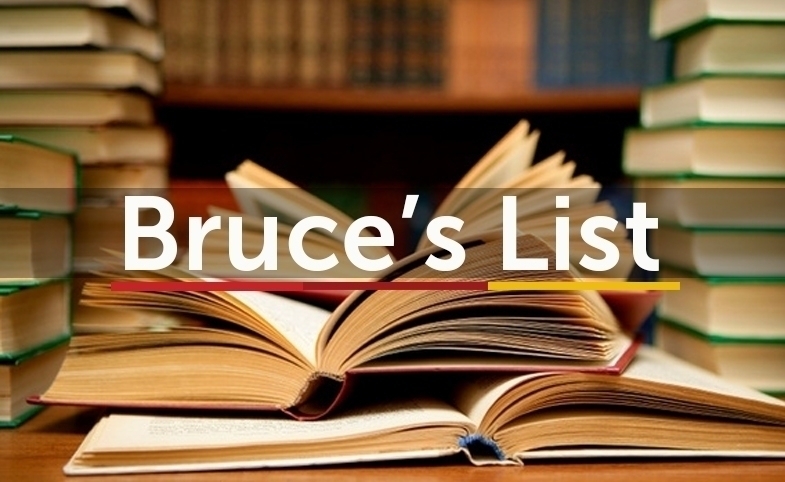To download a PDF of this paper, click here. Building a Robust Capacity Framework for U.S. City Diplomacy By Jay Wang and Sohaela Amiri With cities increasingly poised – and being called upon – to play a...
KEEP READING
Latest Must-Reads in Public Diplomacy: October 2020
The 103rd edition of CPD Faculty Fellow Bruce Gregory's public diplomacy reading list is now available. Known affectionately at CPD as "Bruce's List," this list is a compilation of books, journal articles, papers and blogs on a wide variety of PD topics and features a number of CPD scholars.
Highlights from this latest list include:
Sohaela Amiri and Efe Sevin, eds., City Diplomacy: Current Trends and Future Prospects, (New York: Palgrave Macmillan, 2020). Amiri (Pardee RAND Graduate School) and Sevin (Towson University) have compiled an excellent collection of essays that take the study and practice of city diplomacy to a new level. Their focus goes beyond megacities and high-profile issues (climate, counterterrorism, trade) to include cities of different sizes, city networks and varieties of topics and practices (global governance, twinning, summits, museums, representation, negotiation, public diplomacy, branding). Attention is paid to the mutually advantageous dialogue of scholars and practitioners. Case studies by a geographically diverse group of authors provide evidence-based analyses of cities in and beyond the US and Europe. This book plows new ground in multidisciplinary scholarship and imaginative explorations of evolving roles and methods in diplomatic practice.
Alexander Buhmann and Erich J. Sommerfeldt, Pathways for the Future of Evaluation in Public Diplomacy, CPD Perspectives, USC Center on Public Diplomacy, Paper 1, August 2020. In this exceptionally useful paper, Buhmann (BI Norwegian Business School) and Sommerfeldt (University of Maryland) summarize and explore the implications of twenty-five in-depth anonymous interviews with public diplomacy practitioners in the US Department of State (2017-2018). The authors begin with observations on the state of evaluation in US public diplomacy, a conceptual overview of practitioners’ perspectives on evaluation and a summary of their research methodology. They turn then to a discussion of practitioner responses organized in thematic categories. The balance of the paper is devoted to proposals for changes in approaches and procedures for public diplomacy evaluation. This brief annotation does not do justice to the findings and recommendations in this paper. It is a thoughtful blend of study and practice, which earned recognition as the 2019 Best Faculty Paper from the International Communication Association’s Public Diplomacy Interest Group. It deserves a close read by diplomacy scholars and practitioners.
James Pamment, “The EU’s Role in the Fight Against Disinformation: Developing Policy Interventions for the 2020s,” September 30, 2020; “Crafting a Disinformation Framework,” September 24, 2020; “Taking Back the Initiative,” July 15, 2020, Carnegie Endowment for International Peace. In these three reports, Pamment (Lund University, Carnegie Endowment) examines disinformation threats, definitional and conceptual issues and EU policy choices in the 2020s. The reports, commissioned by the European External Action Service and prepared independently by Pamment, are based on interviews and workshops with experts in the field. They are posted on the Carnegie Endowment’s Partnership for Countering Influence Operations. See also Steven Bradley, “Securing the United States from Online Disinformation – A Whole of Society Approach” August 24, 2020.
William Rugh, “U.S.-China Relations and the Need for Continued Public Diplomacy,” American Diplomacy, August 2020. Ambassador (ret.) Rugh makes a thoughtful case for US public diplomacy in the context of three controversial issues: China’s Confucius Institutes, President Trump’s attacks on VOA and Chinese restrictions on US embassy public diplomacy programs in China. In framing America’s response, he argues that fears of Confucius Institutes are exaggerated and that borders open to Chinese students and students from other authoritarian states, with appropriate safeguards, are beneficial to sending and receiving countries. Lies and election interference should be exposed and countered. “Building walls and closing institutions,” however, works against US national interests.
The full list, including works by CPD Faculty Fellow Vivian Walker, CPD Research Fellow Tara Ornstein and CPD Blog Contributor Kim Andrew Elliot, is available here.
Visit CPD's Online Library
Explore CPD's vast online database featuring the latest books, articles, speeches and information on international organizations dedicated to public diplomacy.
Popular Blogs
-
January 29
-
January 20
-
January 28
-
February 6
-
January 8











